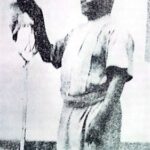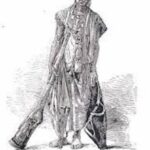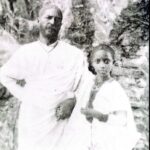GBEWA
- 3 Min Read
Na Gbewa (“Na” meaning paramount chief), or Bawa, the common historical ancestor of the founders of the Mamprusi, Mossi, and Dagomba states of what is now northern Ghana or Upper Volta, flourished perhaps in the 14th but more likely in the earlier 15th century.
He was the youngest son of Kpogonumbo, ruler of Gourma (Gurma) in Upper Volta to the north-east of what is now Ghana, and of Soyini, daughter of Darimani, a ten’dana (Earth priest or clan priest), whose power Kpogonumbo usurped. Through Kpogonumbo, Gbewa was descended from the legendary original ancestor of the Mamprusi, Mossi, and Dagomba peoples, Tohajie, the Red Hunter. There is no certainty about the date of Gbewa’s birth, but he is known to have been the first chieftain of Mamprusi descent to have ruled over a part of what is now northern Ghana.
Little is known of his earlier activities, but Mamprusi tradition says that he succeeded his father as ruler of Gourma on the latter’s death, as his elder brothers had already died. After staying some time in Gourma, Gbewa migrated westward with a large following to the Kusasi and Busanga region in what is now the extreme northeast of Ghana. Here he founded the town of Pusiga, near to modern Bawku, which he made his capital, and here he began to build a new kingdom for himself.
From Pusiga he fought the Kusasi and the Busanga peoples to bring them under his rule. They were by no means entirely subjected by the time of his death, but he appears to have laid the foundations for later domination by subdividing the country into smaller units ruled by head-chiefs chosen from among his leading followers. At Pusiga, therefore he laid the basis for the Mamprusi dynasty that was later to develop.
Gbewa was survived by eight sons and a daughter. His eldest son, Zerile (Zitiri or Sirili), succeeded him after murdering a younger brother, Kofogu, whom Gbewa had chosen as his successor. Upon Zerile’s death, Gbewa’s family split because of a succession dispute. The choice was eventually narrowed down to two sons – Tohugu, the older brother, and Sitobo, the younger. In the struggle for succession it was Sitobu, the founder of the Dagomba state, who won. Tohugu then fled to Nalerigu, 35 miles (56 km) south of Bawku, and founded the state of Mamprusi.
Na Gbewa is also connected with the Mossi and Dagomba states in the following manner. His daughter Yantaure, ran away on horseback after an apparent failure to seize the skin (the equivalent of a throne) during the quarrels among her brothers. She married a Mande hunter named Riale, by whom she had a son, Wadaugo (Widraogo).
Wadaugo founded Tenkudugu in what is now Upper Volta out of which the Mossi kingdom developed. Gbewa’s grandson, Nyagse, the son of Sitobu, established the military power of the Dagomba state, while Gbewa’s other sons founded the minor states of Nanumba, Karaga, Kuga, and Sunson, the latter three being important chieftaincies in Dagomba, while the former is located further south.
BENEDICT G. DER





